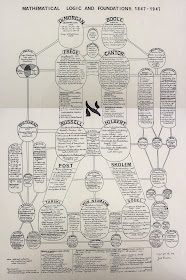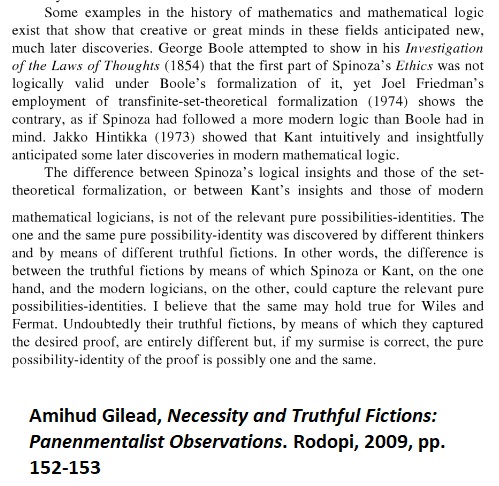 |
| Joel I. Friedman -still uit video zie eind van 't blog |
Joel I.
Friedman is Professor Emeritus, Department of Philosophy, University of
California, Davis - UC Davis [cf.]. Er is van hem geen
pagina met informatie te vinden. Wel had Justin Weinberg vijf jaar terug op een webpagina enige informatie over Joel Friedman, die hij
o.a. van hemzelf had. Het ging Weinberg om het schema waarin Friedman de
geschiedenis samenvatte van de laatste honderd jaar van ontwikkelingen in de wiskundige
logica en fundering ervan: “Mathematical Logic and Foundations, 1847-1947.”
Joel
Friedman liet aan Justin Weinberg weten:
I finished my doctoral dissertation at UCLA in 1966, in logic and foundations of set theory, providing a new theory, called STC (“the set theory of proper classes”), which turned out to be stronger than the von Neumann/Bernays/Goedel theory of sets and proper classes. (For example, Tarski’s Axiom of Strongly Inaccessible Cardinals can be derived in my STC.) My doctoral supervisor was the prominent logician and philosopher of mathematics, Abraham Robinson. He was a real prince of a man, as well as a great mathematical logician. From 1966 to 1971, logic and foundations was my exclusive field of research, and I was hired at UC Davis in 1967 to teach various courses in this area. After 1971, I branched out into other areas of philosophy, over the decades, primarily philosophy of mathematics and science, metaphysics, philosophy of mind, and early modern philosophy (Descartes, Spinoza, and Leibniz). Over the last 15 years, during my retirement, I have focused my research primarily in modal logic and philosophy of mathematics and science, developing a new philosophy called Modal Platonism (MP), first begun when I was a Visiting Fellow at Princeton University (1998-99), working with Bas van Fraassen. I can tell you this MP project is still thrilling to me. Lately during the last several years, I’ve been consulting about MP, with my old teacher/mentor at UCLA, David Kaplan, who was also on my doctoral committee with Robinson. Altogether van Fraassen, Otávio Bueno, Kaplan, and Bernard Molyneux (a UCD colleague) have been most instrumental in spurring me on to the completion of this project. My latest draft paper is called: “Modal Platonism is a Threat to Platonism”.
Hierna gaat hij door over de opzet en ontwikkeling van zijn “ML chart.”
I finished my doctoral dissertation at UCLA in 1966, in logic and foundations of set theory, providing a new theory, called STC (“the set theory of proper classes”), which turned out to be stronger than the von Neumann/Bernays/Goedel theory of sets and proper classes. (For example, Tarski’s Axiom of Strongly Inaccessible Cardinals can be derived in my STC.) My doctoral supervisor was the prominent logician and philosopher of mathematics, Abraham Robinson. He was a real prince of a man, as well as a great mathematical logician. From 1966 to 1971, logic and foundations was my exclusive field of research, and I was hired at UC Davis in 1967 to teach various courses in this area. After 1971, I branched out into other areas of philosophy, over the decades, primarily philosophy of mathematics and science, metaphysics, philosophy of mind, and early modern philosophy (Descartes, Spinoza, and Leibniz). Over the last 15 years, during my retirement, I have focused my research primarily in modal logic and philosophy of mathematics and science, developing a new philosophy called Modal Platonism (MP), first begun when I was a Visiting Fellow at Princeton University (1998-99), working with Bas van Fraassen. I can tell you this MP project is still thrilling to me. Lately during the last several years, I’ve been consulting about MP, with my old teacher/mentor at UCLA, David Kaplan, who was also on my doctoral committee with Robinson. Altogether van Fraassen, Otávio Bueno, Kaplan, and Bernard Molyneux (a UCD colleague) have been most instrumental in spurring me on to the completion of this project. My latest draft paper is called: “Modal Platonism is a Threat to Platonism”.
Hierna gaat hij door over de opzet en ontwikkeling van zijn “ML chart.”
Works by
Joel Friedman: cf. philpapers.org.
Mij gaat
het hier uiteraard om zijn opvallend vele werk over Spinoza
● Joel I. Friedman, Some Settheoretical Partition Theorems
Suggested by the Structure of Spinoza's God. In: Synthese 27 (1-2) May,1974,
pp.199 - 209. [PDF op BookSC]
Amihud Gilead zegt iets over dit artikel in zijn, Necessity and Truthful Fictions.
Cf. ook mijn blog van 22-12-2010: “George Boole (1815 - 1864)
analyseerde met
Booleaanse logica Spinoza’s Ethica,”, waarin ik weinig heel laat van zijn aanpak.
Booleaanse logica Spinoza’s Ethica,”, waarin ik weinig heel laat van zijn aanpak.
● Joel I. Friedman, A Formalization of Spinoza's Ethics, Part
I, 1975
● Joel I. Friedman, The Universal Class has a Spinozistic
Partitioning. In: Synthese 32 (1976),
pp. 403-417 [PDF op BookSC]
● Joel I. Friedman, An Overview of Spinoza's
"Ehics". In Synthese, Vol.
37, No. 1, [Special: Spinoza in Modern Dress] (Jan., 1978), pp.
67-106 [Publisher Springer] [CF. JSTOR; cf. Slideheaven,
cf. PDF op BookSC]. Friedman
deelt in een eindnoot mee dat dit artikel deels gebaseerd is op zijn bijdrage een
het Tercentenary Spinoza symposium dat in maart 1977 gehouden werd aan zijn University
of California, Davis.
Uit dit artikel zomaar twee citaten. Eerst een van p. 72:
Now the objectivist interpretation
may be challenged as follows: why didn't Spinoza simply define 'attribute' as
'that which constitutes the essence of substance'? Why did he need to bring in
intellect, if attributes do objectively exist independently of intellect? My
answer is as follows: something would still have been left out of such a
definition, namely, that each attribute is a way or means for the intellect to
perceive God's essence. Thus, on my view, an attribute has two main
characteristics. First, an attribute is objectively a part of God's essence.
For, God is defined as having infinitely many such attributes, and thus, any
single attribute is only one among many. Secondly, an attribute is a way or
means for any intellect to perceive God's essence. However, any attribute fully
expresses God's essence (and thus 'constitutes' God's essence, in some sense of
'constitutes' (a point I owe to Donagan)), though an attribute is only a part
of that essence and only one among many ways for any intellect to perceive that
essence. According to my interpretation of Spinoza, it is logically impossible
for any intellect, including God's intellect, to perceive God's essence wholly
bare, shorn of all attributes. Rather, any intellect perceives God's essence
through some attribute or other. In the case of God, He perceives His own
essence through infinitely many attributes, simultaneously. Thus God has
infinitely multiple perception.
Ik merk hiertegen op: attributen zijn geen “deel” van Gods
essentie, want die is ondeelbaar.
Een citaat van p. 79:
Throughout Spinoza's system, a great
deal of theological language is used,but in spite of this, it should be
emphasized that God, the maximal substance,is not a person, but Nature itself.
God is Nature. Consequently, God actsaccording to the laws of Nature, which are
identical with the laws of hisnature or essence. Moreover, God's mind is
nothing like a human mind.Spinoza was against any anthropomorphic conception of
God. Indeed, hedevotes most of the Appendix to Part I attacking
anthropomorphism. Inbrief, he holds that we should not project onto Nature or
God such humanqualities as "good and evil, merit and sin, praise and
blame, order anddisorder, beauty and deformity, and so forth". Of course,
Spinoza is open to the charge of atheism, or mysticism, but in my view, these
are all rather loose charges. My own view is that Spinoza blurred the
borderline between atheism and theism and that he rationalized mysticism, both
magnificent achievements.
Friedman maakte in 1978 ook dit schema van het 1e deel van de Ethica [te vinden op de al genoemde website van Justin Weinberg]
● Joel I. Friedman, 'Spinoza's Denial of Free Will. In Jon
Wetlesen (ed.), Spinoza's Philosophy of
Man: Proceedings of the Scandinavian Spinoza Symposium, 1977 [Aarhus, 9th
to 11th May 1977]. Oslo: Universitetsforlaget, 1978, pp. 51-84.
● Joel I. Friedman, The Mystic's Ontological Argument. In: American Philosophica Quarterly, Vol.
16, No 1, January 1979, pp. 73-78 [cf. hier en cf. PDF op BookSC].
● Joel I.
Friedman, Necessity and the Ontological Argument. In: Erkenntnis (1975-), Vol. 15, No. 3 (Nov., 1980), pp. 301-331 [cf. jstor; cf.
tekst op slideheaven; cf. PDF op BookSC]Vol. 16, No.
1 (Jan., 1979), pp. 73-78
● Joel I. Friedman, Was Spinoza Fooled by the Ontological
Argument? In: Philosophia, philosophical
quarterly of Israel, Vol. 11 No. 3-4 (1981), pp. 307–344. [Springer;
PDF op BookSC]
Review by Jonathan Bennett & Peter van Inwagen. In: The Journal of Symbolic Logic, Vol. 49,
No. 3. (Sep., 1984), pp. 997-998. [cf. PDF op de website van Andrew
M. Bailey; PDF op BookSC]
Jonathan Bennett heeft in A
Study of Spinoza's Ethics (1984) enige
verwijzingen naar Friedman [cf. books.google]
● Joel I. Friedman, Spinoza's problem of “other minds”. In: Synthese, Vol. 57, October 1983 [cf. PDF
op BookSC]
● Joel I. Friedman, How the Finite Follows from the Infinite
in Spinoza's Metaphysical System. In: Synthèse
Vol. 69, 3 (1986), 371-407 [cf. PDF op BookSC]
● Joel I. Friedman, The Natural God: A God Even an Atheist Can
Believe In. In: Zygon 21 (3) 1986,
pp. 369-388.
In this paper, I attempt to dissolve the theism/atheism
boundary. In the first part, I consider last things, according to mainstream
science. In the second part, I define the Natural God as the Force of
Nature—evolving, unifying, maximizing—and consider Its relation to last things.
Finally, I discuss our knowledge of the Natural God and Its relevance to our personal
lives. I argue that we can know the Natural God through scientific reason
combined with global intuition, and that this knowledge, (...) [Cf.]
Joel I.
Friedman 12/6/2005 geïnterviewd door William H. Bossart (klik op foto)



Bedankt voor de verwijzingen, bvb naar 'How the finite follows from the infinite in Spinoza's metaphysical system.'
BeantwoordenVerwijderenAlain Badiou tracht in zijn laatste book Spinoza en moderne logica te verenigen.